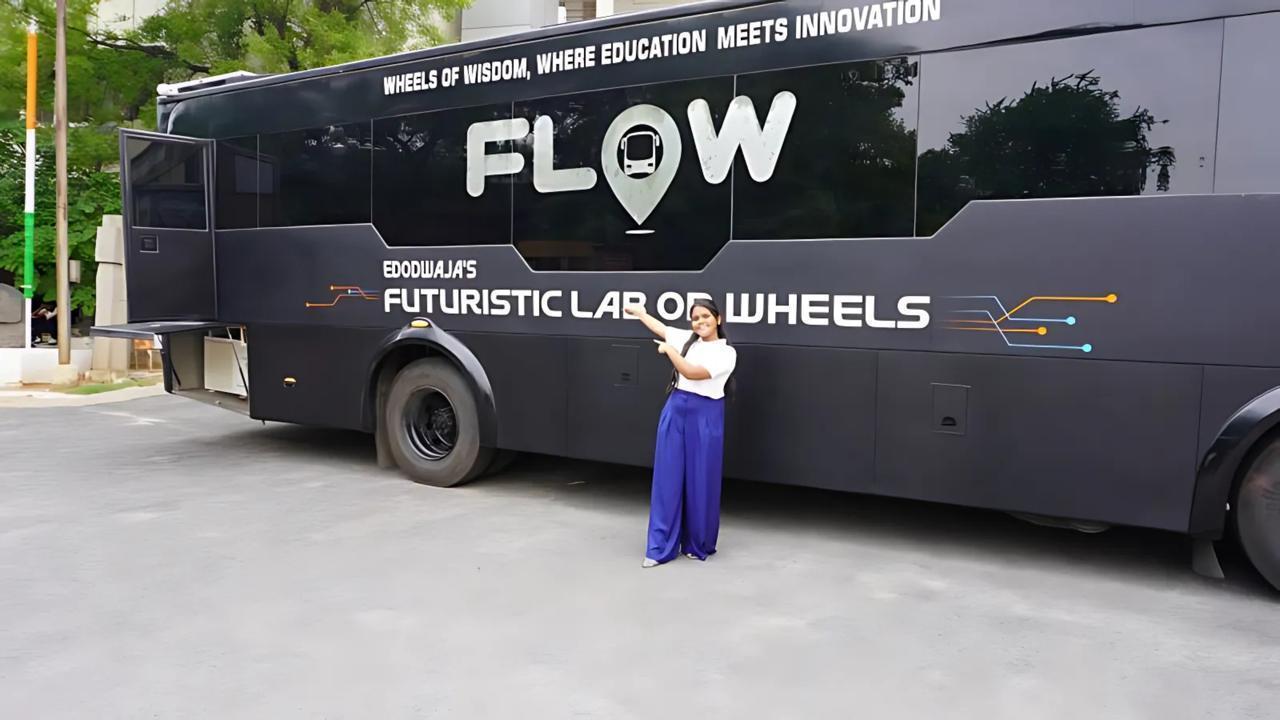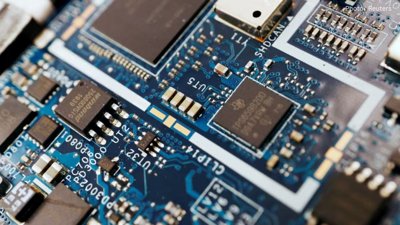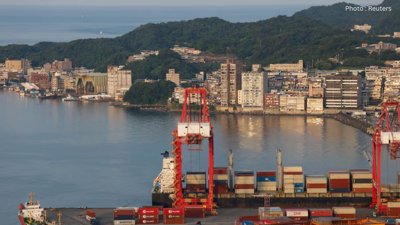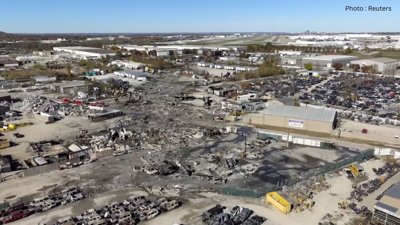
Post by : Amit
Photo : X / Chaithra Sri Kavvampelli
India’s Flow Bus Transforms Rural Education with Mobile Tech Labs Bringing AI, Robotics to Underserved Communities
On dusty village roads and across remote landscapes of India, an unusual sight is capturing the imagination of rural communities: a brightly colored bus not ferrying passengers but carrying technology, innovation, and dreams. This is the Flow Bus—a one-of-its-kind mobile technology laboratory that is taking digital education, robotics, artificial intelligence, and innovation directly to the doorsteps of those who have long remained on the margins of India's digital revolution.
Bridging the Urban-Rural Digital Divide
Launched with the aim of democratizing access to advanced technologies, the Flow Bus project is the brainchild of visionary educators and technologists who believe that innovation should not remain confined to urban centers or elite institutions. In India, where millions in rural areas still struggle with basic digital literacy, initiatives like Flow Bus are a crucial step toward inclusive development.
By transforming an ordinary bus into a high-tech laboratory on wheels, the Flow team is physically bridging the digital divide—bringing state-of-the-art learning experiences to villages, small towns, and remote schools that otherwise lack the infrastructure or resources to teach children about cutting-edge technologies.
What’s Inside the Flow Bus?
The Flow Bus is more than just a vehicle—it is a moving classroom, lab, and innovation hub. The interiors are equipped with robotics kits, virtual reality (VR) headsets, artificial intelligence learning tools, and interactive digital displays. The goal is to create an immersive, hands-on learning environment where students can explore the basics of coding, AI, robotics, and digital problem-solving.
Children and young adults in rural communities get to build simple robots, engage with AI-based applications, and visualize complex scientific concepts through augmented and virtual reality. These hands-on experiences are designed not just to teach theoretical knowledge but to spark curiosity, creativity, and the desire to innovate.
Taking Innovation to the Grassroots
The uniqueness of Flow Bus lies in its grassroots approach. Instead of waiting for rural populations to travel to distant cities or institutions, the innovation is delivered to their doorsteps. The bus follows carefully designed routes covering multiple villages and schools, setting up temporary tech classrooms wherever it stops.
This method ensures that no community is left untouched. Even those in the most remote corners of the country get access to quality STEM (Science, Technology, Engineering, Mathematics) education—often for the first time. The interactive sessions are tailored to different age groups, making complex concepts accessible and fun for children, teenagers, and even curious adults.
Empowering the Next Generation with Digital Skills
The Flow Bus initiative is more than just an educational exercise—it is a movement aimed at preparing India’s rural youth for the digital future. As the global economy increasingly relies on AI, automation, and digital technologies, equipping young minds with foundational knowledge in these areas is vital.
In villages where education is often limited to rote learning and outdated curricula, Flow Bus introduces a new way of thinking: experiential learning, problem-solving, and innovation-driven education. The skills imparted—basic programming, robotics, digital literacy—can eventually empower young people to access better job opportunities, pursue higher education in STEM fields, and even become tech entrepreneurs.
Supporting Government’s Digital India Vision
The Flow Bus aligns seamlessly with the Indian government’s Digital India mission, which seeks to transform the country into a digitally empowered society and knowledge economy. While the government has made significant strides in expanding internet connectivity and digital services, rural digital literacy remains a persistent challenge.
Flow Bus addresses this gap by going beyond connectivity—it brings the knowledge and tools needed to truly participate in the digital economy. This mobile learning model complements national efforts by ensuring that grassroots populations are not left behind as the country leaps into Industry 4.0.
Community Engagement: Inspiring Hope and Curiosity
In every village it visits, the Flow Bus creates a palpable sense of excitement and curiosity. For many children, this is their first direct encounter with advanced technologies like robotics or virtual reality. The interactive nature of the sessions keeps students engaged, while real-life demonstrations help them visualize how technology can solve real-world problems.
The bus also engages with local teachers, helping them integrate digital concepts into traditional curricula. Community elders, parents, and local leaders are invited to witness the programs, fostering broader acceptance and enthusiasm for tech education.
Real Impact: Stories of Transformation
Already, Flow Bus has made measurable impact in the communities it serves. Testimonials from rural students who, inspired by the bus sessions, have taken up coding or science projects, highlight the transformative potential of the initiative.
In some villages, children who once saw technology as alien or intimidating now speak confidently about robotics and AI. Teachers report increased classroom participation and an observable shift in students’ attitudes towards science and innovation.
These success stories underline how small interventions, when delivered with passion and purpose, can ignite big dreams.
Overcoming Challenges on the Road
Despite its success, the Flow Bus journey is not without challenges. The team has to navigate poor road conditions, limited electricity in some areas, and occasional skepticism from communities unfamiliar with technology. Funding and sustainability are also ongoing concerns, as maintaining high-quality equipment and traveling across vast distances require significant resources.
However, the Flow team remains committed to its vision, continuously seeking partnerships with NGOs, corporate sponsors, and government bodies to expand its reach and impact.
Scaling Up: The Road Ahead for Flow Bus
Looking ahead, the Flow Bus initiative aims to scale its operations by deploying more buses across multiple states. There are also plans to introduce specialized programs focusing on topics like environmental technology, healthcare innovation, and agricultural tech—each tailored to the unique needs and aspirations of different communities.
By fostering public-private partnerships and leveraging CSR funding, the Flow team hopes to make mobile tech education a permanent fixture in India’s educational landscape.
A Model for Global Inspiration
The Flow Bus concept holds immense potential not only for India but also for other developing nations facing similar digital literacy gaps. As governments and educators worldwide grapple with the challenge of making STEM education inclusive and accessible, mobile learning platforms like Flow Bus present an innovative and scalable solution.
In the future, such models could be adapted to teach everything from healthcare practices to climate resilience, ensuring that no community, no matter how remote, is left behind in the global knowledge economy.
Taking Technology to the Heart of India
The Flow Bus is more than just a vehicle—it is a symbol of empowerment, opportunity, and the belief that every child, regardless of geography or background, deserves access to the tools of the future. As it continues to roll through India's rural heartlands, the Flow Bus is quietly transforming lives, one village, one classroom, and one curious mind at a time.
Villages, India, Rural










Advances in Aerospace Technology and Commercial Aviation Recovery
Insights into breakthrough aerospace technologies and commercial aviation’s recovery amid 2025 chall

Defense Modernization and Strategic Spending Trends
Explore key trends in global defense modernization and strategic military spending shaping 2025 secu

Tens of Thousands Protest in Serbia on Anniversary of Deadly Roof Collapse
Tens of thousands in Novi Sad mark a year since a deadly station roof collapse that killed 16, prote

Canada PM Carney Apologizes to Trump Over Controversial Reagan Anti-Tariff Ad
Canadian PM Mark Carney apologized to President Trump over an Ontario anti-tariff ad quoting Reagan,

The ad that stirred a hornets nest, and made Canadian PM Carney say sorry to Trump
Canadian PM Mark Carney apologizes to US President Trump after a tariff-related ad causes diplomatic

Bengaluru-Mumbai Superfast Train Approved After 30-Year Wait
Railways approves new superfast train connecting Bengaluru and Mumbai, ending a 30-year demand, easi